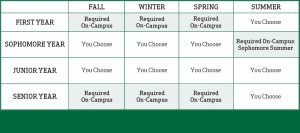As its name implies, a Four-Year Plan is your long-term plan for your four years in college. This plan helps you to stay on track with your long-term goals (i.e. completion of your major/minor, internships, study abroad opportunities, and personal projects). To create a Four-Year Plan, try to map out each year that you will spend in college. You can use an Excel sheet, a Word document, or a pencil and a piece of paper. As a suggestion, we recommend that your Four-Year Plan should roughly follow this template (please see Four-Year Plan Template Example).
If you would like a copy of the Dartmouth Four Year Plan Template Example, then please click on the link.
Before we start filling out our Four-Year Plan. Let’s first write down our long-term goal. As an exercise, let’s think about our long-term educational goal. Here’s a template to help guide you:
I would like to pursue a major in (insert major), with a minor in (insert minor). I believe that these fields of study will prepare me for a career in the (insert vocation/industry). In order to achieve these goals, I plan to learn (skill one) in one year. In addition, I will also learn (skill two) by the end of my sophomore year.
Notice that we’ve color coded this example so that blue represents your overarching goal, orange represents the intermediate steps to accomplishing your goal, and purple represents the timeline for accomplishing these intermediate steps.
For our example, we’ll talk about a student interested in computer engineering – who aspires to work in the tech industry. It’s important to note that this is just one example of the many majors that you can choose at Dartmouth. You could major in Geography, Physics, History, Biology, Economics, Chinese, and much more. To explore these majors, click on their respective links.
I would like to pursue a major in Computer Engineering, with a minor in Philosophy. I believe that these fields of study will prepare me for a career in the tech industry. In order to achieve these goals, I plan to learn four programming languages (Java, C++, Python, and SQL) in one year (i.e. I will learn one new programming language every three months). In addition, I will create my own smartphone app by the end of my sophomore year so that I can gain relevant coding experience. Finally, I'd like to read three classic philosophy texts so that I can complete a research project on philosophy during my junior year.
Example (Computer Engineering Major and Philosophy Minor):
From reading this, we can immediately identify four long-term goals:
- Complete a major in Computer Engineering and a minor in Philosophy
- Obtain a job in the tech industry
- Learn four new programming languages in one year
- Create a smartphone app by the end of sophomore year
- Read three classic philosophy texts: "Letters from a Stoic" by Seneca, "Meditations" by Marcus Aurelius, and "The Essentials Epicurus" by Epicurus
- Complete a research project on philosophy
These long-term goals can be divided into smaller milestones. For example, if your long-term goal is to complete a Computer Engineering major, then you should plan to complete Calculus 3 by the end of your first year. If you want to obtain a job in the tech industry upon graduation, then you may want to intern at a tech company during the summer of your junior year. Try to include these intermediate milestones in your Four-Year Plan (please see Four-Year Plan Template Example).
If you look at Step 2 in the Excel sheet, you'll notice that our Four-Year Plan looks a bit sparse. Let’s add in some additional long-term goals. Remember that these goals need not be exclusively related to academics, they can cover hobbies and other passions (please see Step 3 of the Excel sheet).
There you have it, we’ve completed making our Four-Year Plan. Take a moment to download a blank Four-Year Plan template and try filling it out!
